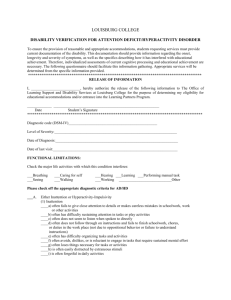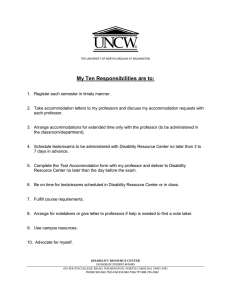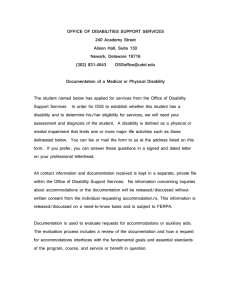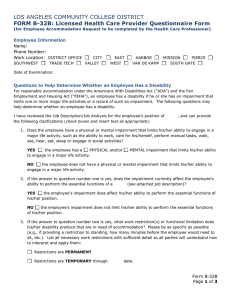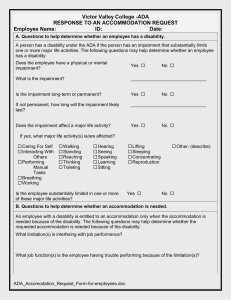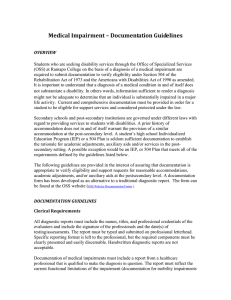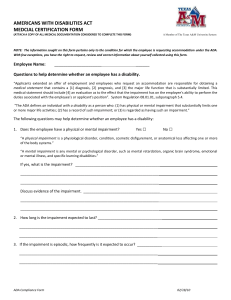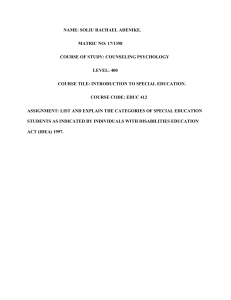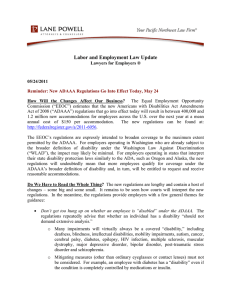T U O
advertisement
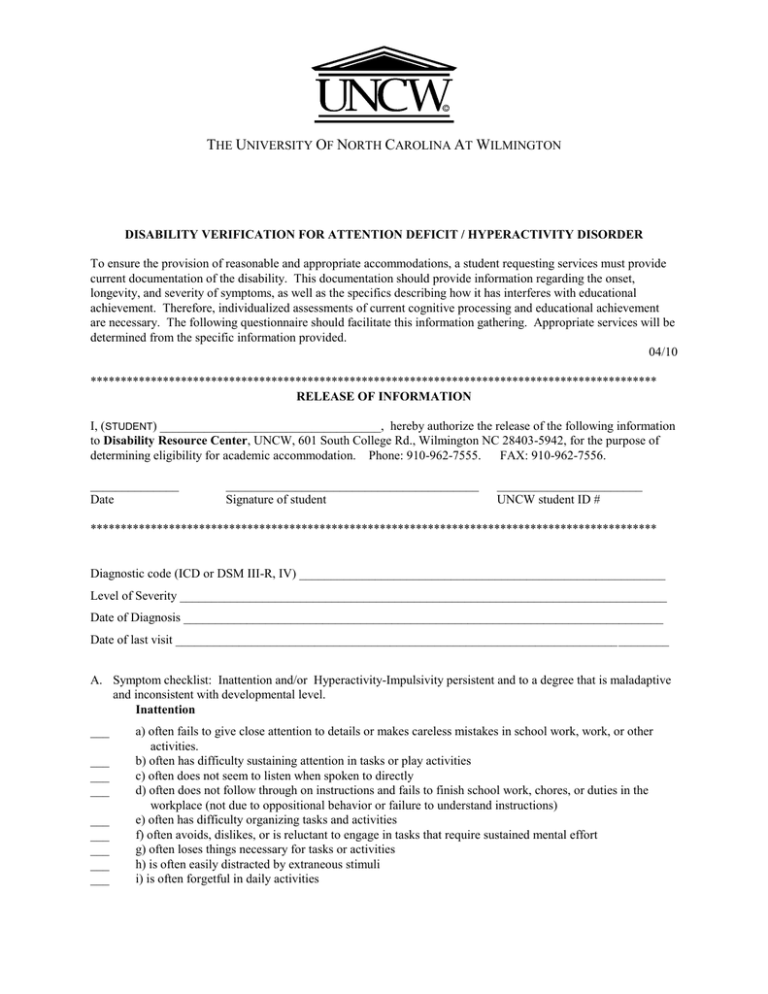
THE UNIVERSITY OF NORTH CAROLINA AT WILMINGTON DISABILITY VERIFICATION FOR ATTENTION DEFICIT / HYPERACTIVITY DISORDER To ensure the provision of reasonable and appropriate accommodations, a student requesting services must provide current documentation of the disability. This documentation should provide information regarding the onset, longevity, and severity of symptoms, as well as the specifics describing how it has interferes with educational achievement. Therefore, individualized assessments of current cognitive processing and educational achievement are necessary. The following questionnaire should facilitate this information gathering. Appropriate services will be determined from the specific information provided. 04/10 ********************************************************************************************** RELEASE OF INFORMATION I, (STUDENT) ___________________________________, hereby authorize the release of the following information to Disability Resource Center, UNCW, 601 South College Rd., Wilmington NC 28403-5942, for the purpose of determining eligibility for academic accommodation. Phone: 910-962-7555. FAX: 910-962-7556. ______________ Date ________________________________________ Signature of student _______________________ UNCW student ID # ********************************************************************************************** Diagnostic code (ICD or DSM III-R, IV) __________________________________________________________ Level of Severity _____________________________________________________________________________ Date of Diagnosis ____________________________________________________________________________ Date of last visit ______________________________________________________________________________ A. Symptom checklist: Inattention and/or Hyperactivity-Impulsivity persistent and to a degree that is maladaptive and inconsistent with developmental level. Inattention ___ ___ ___ ___ ___ ___ ___ ___ ___ a) often fails to give close attention to details or makes careless mistakes in school work, work, or other activities. b) often has difficulty sustaining attention in tasks or play activities c) often does not seem to listen when spoken to directly d) often does not follow through on instructions and fails to finish school work, chores, or duties in the workplace (not due to oppositional behavior or failure to understand instructions) e) often has difficulty organizing tasks and activities f) often avoids, dislikes, or is reluctant to engage in tasks that require sustained mental effort g) often loses things necessary for tasks or activities h) is often easily distracted by extraneous stimuli i) is often forgetful in daily activities 2 Hyperactivity-Impulsivity ___ ___ ___ ___ ___ ___ ___ ___ ___ a) often fidgets with hands or feet or squirms in seat b) often leaves seat in classroom or in other situations in which remaining seated is expected c) often runs about or climbs excessively in situations in which it is inappropriate (in adolescents or adults, may be limited to subjective feelings of restlessness) d) often has difficulty playing or engaging in leisure activities quietly e) is often “on the go” or often acts as if “driven by a motor” f) often talks excessively g) often blurts out answers before questions have been completed h) often has difficulty awaiting turn i) often interrupts or intrudes on others B. History: Some hyperactive-impulsive or inattentive symptoms causing impairment were present before age 7 years, as based on: ______ Family report ______ School records C. Some impairment from the symptoms is present in two or more settings. D. There is clear evidence of clinically significant impairment in social, academic, or occupation setting. Evidence of a significant impairment to learning MUST accompany this documentation. Attach report including: tests administered, test results, specific recommendations for accommodations, and justification for each accommodation recommended. Academic Impairment Academic Accommodation Recommended ________________________________ _______________________________________________________ ________________________________ _______________________________________________________ ________________________________ _______________________________________________________ ________________________________ _______________________________________________________ Failure to provide recommendation for accommodation and justification for these recommendations will result in an inability to accommodate this student. E. The symptoms do not occur exclusively during the course of a Pervasive Developmental Disorder, Schizophrenia, or other Psychotic Disorder, and are not better accounted for by another mental disorder. Medication prescribed ________________________ Response to Rx ____________________________________ Therapy prescribed ____________________________________________________________________________ Evaluating professional is to be a licensed or otherwise qualified professional who has undergone appropriate and comprehensive training in the diagnosis of AD/HD and has no personal relationship with the individual being evaluated. Provider’s name________________________________________ Title _______________________________ Address ______________________________________________ Phone(s)____________________________ ______________________________________________ ____________________________ Signature _____________________________________________ Date ________________ DISABILITY RESOURCE CENTER DIVISION OF STUDENT AFFAIRS 601 SOUTH COLLEGE ROAD, WILMINGTON, NORTH CAROLINA 28403-5942 PHONE 910-962-7555 FAX 910-962-7556 TTY 800-735-2962

